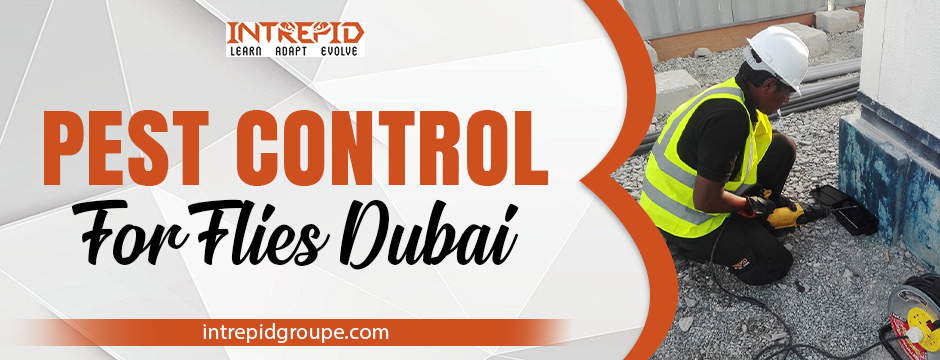
If there’s one pest that tests the patience of Dubai’s residents and business owners every year, it’s the common fly. They may look harmless, but in a city known for world-class hospitality and hygiene standards, even a few flies can damage a brand’s reputation or turn a home into a constant battle zone. The secret to keeping them under control isn’t just reacting when you see them—it’s knowing when and why they appear, and preparing ahead of time.
At Intrepid, we’ve seen fly activity rise and fall across the UAE in predictable patterns every year. Understanding these seasonal trends helps property owners, facilities managers, and business operators stay ahead before infestations start.
Understanding Fly Behavior in the UAE
Flies thrive in warm, moist environments with easy access to food and waste. Dubai’s climate—hot summers, mild winters, and the occasional rain—creates an ideal breeding ground if waste management and sanitation aren’t handled properly. Unlike cooler regions where flies vanish in winter, Dubai’s year-round warmth allows them to persist, though their intensity changes seasonally.
To manage them effectively, you first need to understand how each season affects their life cycle.
January to March: Mild Activity but Hidden Risks
The first quarter of the year is often comfortable for residents and tourists. The cooler weather means fewer flies buzzing around, but that doesn’t mean they’re gone.
Many species of flies, such as the housefly and drain fly, survive in low numbers by breeding in moist drains, garbage chutes, and kitchen corners. Because activity is low, it’s easy to ignore them—but this is precisely when proactive steps matter most.
Prevention tips for early-year months:
- Deep-clean drains and grease traps in commercial kitchens.
- Ensure garbage bins have tight-fitting lids.
- Schedule a routine inspection with a pest control for flies in Dubai specialist before the summer rush begins.
Treating small infestations early helps avoid massive outbreaks later.
April to May: The Buildup Before the Surge
As temperatures begin to rise, fly breeding accelerates. By April, eggs hatch faster, and food waste left in warm conditions can attract swarms within hours. This period acts as a warning sign—what you do now determines what happens in summer.
During these months, flies start migrating from outdoor breeding areas like garbage skips, construction sites, and landscaping waste toward shaded indoor areas.
Best practices during this phase:
- Inspect outdoor bins daily and clean them regularly.
- Check for standing water near air-conditioning outlets or flowerpots.
- Use fine mesh screens on doors and windows, especially in kitchens or service areas.
- Start professional monitoring or baiting systems for fly control in Dubai to intercept breeding early.
Businesses, particularly restaurants and hotels, should treat this period as their “maintenance season.” Preventive pest control contracts often start here, ensuring you’re not scrambling when the weather turns extreme.
June to August: Peak Fly Infestation Season
Dubai’s summer is not just about scorching heat—it’s also the most active breeding time for flies. During these months, temperatures regularly exceed 40°C, accelerating the fly lifecycle dramatically. What takes 10 days in cooler months can happen in just 2–3 days now.
If food waste, uncovered bins, or unclean drains exist, infestations can multiply overnight. For hospitality and food service businesses, this is the critical season where prevention must turn into action.
June to August Fly Control Calendar
| Month | Condition | Recommended Action |
| June | Rising heat and humidity | Begin intensive cleaning, inspect garbage rooms, service grease traps. |
| July | Peak activity period | Apply professional fly baits and residual treatments; monitor high-traffic areas daily. |
| August | Sustained infestations indoors | Reinforce door air curtains, replace UV bulbs in fly traps, review sanitation logs. |
At Intrepid, we recommend setting up pest control for flies in Dubai programs at least a month before June. The earlier you start, the easier it becomes to maintain a fly-free environment during the toughest months.
September to October: Post-Rain Challenges
Dubai occasionally experiences short rain spells or increased humidity in early autumn. What seems like temporary relief from the heat often triggers a fresh wave of fly activity. Rainwater mixes with organic matter, creating perfect breeding pockets in drains, roof gutters, and outdoor waste zones.
Flies also tend to move indoors to escape the heat, especially in areas where doors remain open for customers or deliveries.
Pre-emptive measures for post-rain months:
- Clean roof drains and downspouts after rainfall.
- Remove organic debris and mulch buildup near landscaping areas.
- Conduct post-rain fogging or residual treatments around waste areas.
- Tighten sanitation protocols in kitchens and service corridors.
Hotels, warehouses, and food-processing units should use this time to audit their pest control logs and schedule touch-up treatments. Reactive cleaning after rains often comes too late; preventive action right after rain ensures fly populations don’t explode again.
November to December: Cooling Down, Not Letting Up
When the temperature drops, fly populations start to decline, but their breeding doesn’t stop completely. Cooler months mean slower reproduction, but any existing larvae in warm, protected areas—like garbage rooms, drains, and compost bins—will continue to mature.
This is a great time to evaluate the effectiveness of your annual pest management strategy.
End-of-year fly control checklist:
- Replace fly-trap bulbs and glue boards for the coming year.
- Deep clean storage and garbage areas.
- Review pest activity records to identify recurring hotspots.
- Renew your fly control in Dubai contract before the new year’s surge.
Consistent documentation and ongoing maintenance make compliance audits easier for businesses and reduce future risks.
Why Flies Are More Than Just a Nuisance
Flies don’t just irritate—they contaminate. A single fly can carry over 60 pathogens, including salmonella and E. coli. In a hospitality-driven economy like Dubai, this can result in customer complaints, inspection penalties, or even business closures.
The Dubai Municipality holds strict hygiene standards, especially for restaurants and hotels. Maintaining a fly-free environment isn’t just a matter of comfort; it’s a regulatory requirement.
This is where professional expertise makes all the difference. While DIY methods like fly sprays or homemade traps might seem cost-effective, they only address surface-level problems. True control requires identifying breeding sources, interrupting life cycles, and maintaining consistent monitoring.
Integrated Fly Management: The Intrepid Way
At Intrepid, we don’t just eliminate flies—we design strategies to keep them away all year long. Our approach combines science, experience, and local insight tailored to Dubai’s unique environment.
Our key methods include:
- Source elimination: We inspect and target breeding sites rather than just killing adult flies.
- Residual treatments: Safe, long-lasting applications around key zones such as garbage rooms, loading bays, and kitchens.
- Fly light traps and baits: Modern, discreet systems that monitor and reduce activity continuously.
- Sanitation audits: Guidance for your cleaning teams to align hygiene practices with pest management goals.
- Seasonal scheduling: Preventive maintenance based on Dubai’s yearly climate and infestation trends.
For businesses, we also provide documentation and audit support to meet municipal inspection standards—ensuring you stay both compliant and fly-free.
Planning Ahead Saves Time, Money, and Reputation
One of the biggest mistakes property owners make is waiting until they see flies to act. By then, the problem is usually widespread. Preventive pest control doesn’t just protect your environment—it protects your reputation and customer experience.
Think of pest control as insurance for your hygiene standards. A small, consistent investment in monitoring and seasonal treatments can save you from expensive emergency callouts, product losses, or negative reviews.
Practical Takeaways for Residents and Businesses
To make it simple, here’s how you can stay ahead year-round:
- January–March: Inspect and sanitize. Prepare for warmer months.
- April–May: Start preventive treatments. Check waste and drainage systems.
- June–August: Intensify monitoring. Apply professional control solutions.
- September–October: Post-rain inspections and sanitation.
- November–December: Review, document, and renew maintenance plans.
Whether you manage a restaurant, warehouse, or villa, this simple cycle helps ensure that fly infestations remain a minor inconvenience rather than a major problem.
Final Thoughts
Dubai’s vibrant environment demands equally dynamic hygiene and pest management standards. Flies adapt quickly to changes in weather and waste patterns, which means the only effective strategy is staying one step ahead. Understanding when infestations peak allows you to prepare early, protect your customers, and maintain the cleanliness your brand deserves.
At Intrepid, we specialize in pest control for flies in Dubai, offering tailored solutions for homes, hotels, and commercial facilities. With a preventive approach and year-round service plans, we help you stay compliant, comfortable, and confidently pest-free—no matter the season.
Ready to prepare before the next fly season hits?
Contact Intrepid today to schedule your site inspection and build your customized fly control in Dubai plan. Prevention starts with one call, and peace of mind lasts all year.

















Leave a Reply